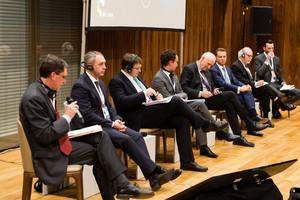
The Session was delivered within the framework of the Ninth International Forum on Energy for Sustainable Development, held in Kyiv, Ukraine, on 12-15 November 2018
The session was focused on methane management in extractive industries, addressing in particular problems and opportunities in the gas and in the coal sectors.
It was opened by Mr. Maksym Nemchinov, the State Secretary in the Ministry of Energy and Coal Industry of Ukraine. The debate was moderated by Mr. Mark Radka, the Chief of the Energy and Climate Branch of the Economy Division at the UN Environment, and it featured the following panellists: Mr. Cristian Carraretto, the Associate Director of the Energy Efficiency & Climate Change at the European Bank for Reconstruction and Development (EBRD), Mr. Torleif Haugland, a Senior Partner at Carbon Limits, Mr. Jason Hummel, a United States Environmental Protection Agency’s (US EPA) Contractor and a Global Methane Initiative (GMI) Project Network Member, Mr. Oleksii Khabatiuk, the Deputy Head of the Energy Efficiency Department at Naftogaz, Mr. Julien Perez, the Strategy & Policy Director at the Oil and Gas Climate Initiative (OGCI), and Mr. Raymond Pilcher, the Chair of the UNECE Group of Experts on Coal Mine Methane.
The session started with the overview of the project that EBRD and Naftogas have recently embarked on in Ukraine. The presentation of its scope and objectives led to the discussion on methane emission abatement opportunities, which was held in the context of climate change. It was observed that it is technically possible to remove 75% of methane emissions from the gas sector. Furthermore, half of the emissions was said to have a potential for being removed at the negative abatement cost.
The importance of measurement and its accuracy was also raised, as it was highlighted that without reliable measurement it is impossible to make any investment plans and obtain credits. At the same time, measurement itself was said not to be sufficient, and therefore a need for a multi-component quantification was expressed.
Since fugitive emissions were identified as the most problematic, detecting leakages was underlined as being of crucial importance. Lack of awareness, but also of motivation to prevent such emissions were told to be the main barriers to addressing the problem. In the latter case, government regulations and financial incentives were identified as the key forces driving the companies into action. In the context of monetary incentives, the need to create the output for the captured gas, and the establishment of the “methane price” were discussed.
While analysing the situation in the coal sector, the issue of ownership of methane was identified as an obstacle that oftentimes prevents the development of the CMM projects. Making the mines responsible for the gas that they release was mentioned as a potential remedy to that problem. Projects development was said to be also impeded by the lack of financing opportunities. It was observed that CMM suffers from its association with coal that effectively discourages lending institutions from engagement in any initiatives aiming at CMM capture and use.

